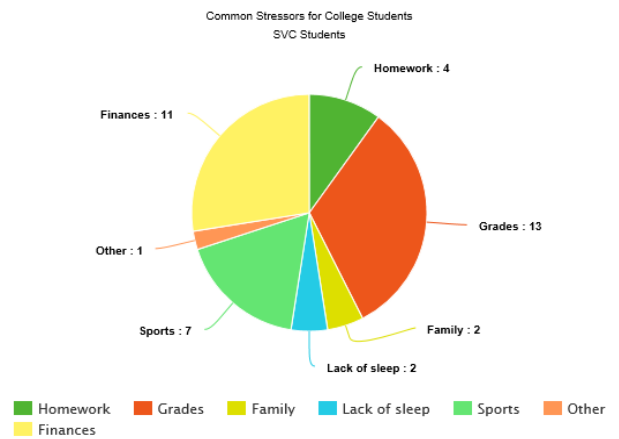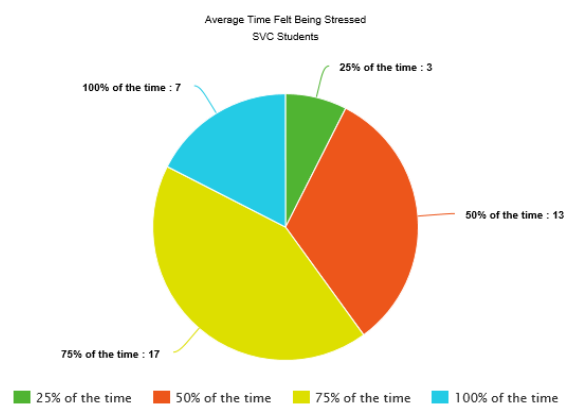Chronic Stressing at SVC
Stressing out – it’s the College Circle of Life.
The term “stressed out” is synonymous with college life, but what is it about being a student in the 21st century that puts so much pressure and stress on the average student? The Looking Glass conducted a survey asking 40 SVC students anonymously what aspects of college life they found to be stressful, and how much of their time here at school they feel stressed. After reading the responses students gave, it was clear that SVC students are stressed out; and they’re not alone.

On average, the most common stressor SVC students reported was grades, followed by finances. Other stressors included sports, homework, and family. Most students spend 75% of their time during the day feeling stressed, followed by a large group who spend 50% of their time feeling stressed. While this data may come to a surprise to some, recognizing how much pressure students have while balancing these stressful factors not only validates but also addresses the fact that many college students may be suffering from chronic stress.

While identifying what causes students the most stress, it is important to recognize how much of our time we spend being stressed. If we can identify what factors of our lifestyles put more pressure on us, we can do our best to minimize the effect of that pressure, and the time spent being stressed over it. While it may be hard to qualify certain “stressors” to cause more time spent stressed than others, it has been proven that long term stress may take a toll on one’s body.
According to the American Psychological Association, “In one study, researchers examined the association between “positive affect” feelings like happiness, joy, contentment and enthusiasm, and the development of coronary heart disease over a decade. They found that for every one-point increase in positive affect on a five-point scale, the rate of heart disease dropped by 22 percent.” The long term effects of chronic stress are evident in heart disease, depression, chronic migraines, and many other potentially debilitating ailments. If we can better understand and try to combat our stress, we have a higher chance of avoiding health problems later in life.
With data like this, one can assume that there is something we as a community can do to either reduce the time we spend stressed over our grades, or take a look at why this factor of college life is so stressful. Freshman Cheyenne Prouty states, “Stress is something that we all deal with, whether its large scale or small scale, it’s all affected by how you manage it.” By identifying the root of our stress, and acknowledging the amount of time we spend obsessing over that stress, we can more effectively try to reduce the pressures of college life. For the benefit of our emotional and physical health, reducing our stress levels is crucial for more than just short term results.







